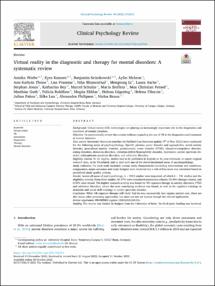Virtual reality in the diagnostic and therapy for mental disordersA systematic review

Virtual reality in the diagnostic and therapy for mental disorders
A systematic review

| dc.contributor.author | Wiebe, Annika | |
| dc.contributor.author | Kannen, Kyra | |
| dc.contributor.author | Selaskowski, Benjamin | |
| dc.contributor.author | Mehren, Aylin | |
| dc.contributor.author | Thöne, Ann-Kathrin | |
| dc.contributor.author | Pramme, Lisa | |
| dc.contributor.author | Blumenthal, Nike | |
| dc.contributor.author | Li, Mengtong | |
| dc.contributor.author | Asché, Laura | |
| dc.contributor.author | Jonas, Stephan | |
| dc.contributor.author | Bey, Katharina | |
| dc.contributor.author | Schulze, Marcel | |
| dc.contributor.author | Steffens, Maria | |
| dc.contributor.author | Pensel, Max Christian | |
| dc.contributor.author | Guth, Matthias | |
| dc.contributor.author | Rohlfsen, Felicia | |
| dc.contributor.author | Ekhlas, Mogda | |
| dc.contributor.author | Lügering, Helena | |
| dc.contributor.author | Fileccia, Helena | |
| dc.contributor.author | Pakos, Julian | |
| dc.contributor.author | Lux, Silke | |
| dc.contributor.author | Philipsen, Alexandra | |
| dc.contributor.author | Braun, Niclas | |
| dc.date.accessioned | 2023-04-28T12:31:15Z | |
| dc.date.available | 2023-04-28T12:31:15Z | |
| dc.date.issued | 30.10.2022 | |
| dc.identifier.uri | https://hdl.handle.net/20.500.11811/10810 | |
| dc.description.abstract | Background: Virtual reality (VR) technologies are playing an increasingly important role in the diagnostics and treatment of mental disorders. Objective: To systematically review the current evidence regarding the use of VR in the diagnostics and treatment of mental disorders. Data source: Systematic literature searches via PubMed (last literature update: 9th of May 2022) were conducted for the following areas of psychopathology: Specific phobias, panic disorder and agoraphobia, social anxiety disorder, generalized anxiety disorder, posttraumatic stress disorder (PTSD), obsessive-compulsive disorder, eating disorders, dementia disorders, attention-deficit/hyperactivity disorder, depression, autism spectrum dis- order, schizophrenia spectrum disorders, and addiction disorders. Eligibility criteria: To be eligible, studies had to be published in English, to be peer-reviewed, to report original research data, to be VR-related, and to deal with one of the above-mentioned areas of psychopathology. Study evaluation: For each study included, various study characteristics (including interventions and conditions, comparators, major outcomes and study designs) were retrieved and a risk of bias score was calculated based on predefined study quality criteria. Results: Across all areas of psychopathology, k = 9315 studies were inspected, of which k = 721 studies met the eligibility criteria. From these studies, 43.97% were considered assessment-related, 55.48% therapy-related, and 0.55% were mixed. The highest research activity was found for VR exposure therapy in anxiety disorders, PTSD and addiction disorders, where the most convincing evidence was found, as well as for cognitive trainings in dementia and social skill trainings in autism spectrum disorder. Conclusion: While VR exposure therapy will likely find its way successively into regular patient care, there are also many other promising approaches, but most are not yet mature enough for clinical application. Review registration: PROSPERO register CRD42020188436. Funding: The review was funded by budgets from the University of Bonn. No third party funding was involved. | en |
| dc.format.extent | 39 | |
| dc.language.iso | eng | |
| dc.rights | Namensnennung 4.0 International | |
| dc.rights.uri | http://creativecommons.org/licenses/by/4.0/ | |
| dc.subject | Virtual reality | |
| dc.subject | VR | |
| dc.subject | Assessment | |
| dc.subject | Diagnostics | |
| dc.subject | Therapy | |
| dc.subject | Mental disorders | |
| dc.subject.ddc | 150 Psychologie | |
| dc.title | Virtual reality in the diagnostic and therapy for mental disorders | |
| dc.title.alternative | A systematic review | |
| dc.type | Wissenschaftlicher Artikel | |
| dc.publisher.name | Elsevier | |
| dc.rights.accessRights | openAccess | |
| dcterms.bibliographicCitation.volume | 2022, vol. 98 | |
| dcterms.bibliographicCitation.issue | no. 102213 | |
| dcterms.bibliographicCitation.pagestart | 1 | |
| dcterms.bibliographicCitation.pageend | 39 | |
| dc.relation.doi | https://doi.org/10.1016/j.cpr.2022.102213 | |
| dcterms.bibliographicCitation.journaltitle | Clinical Psychology Review | |
| ulbbn.pubtype | Zweitveröffentlichung | |
| dc.version | publishedVersion | |
| ulbbn.sponsorship.oaUnifund | OA-Förderung Universität Bonn |
Files in this item
This item appears in the following Collection(s)
-
Publikationen (11)




